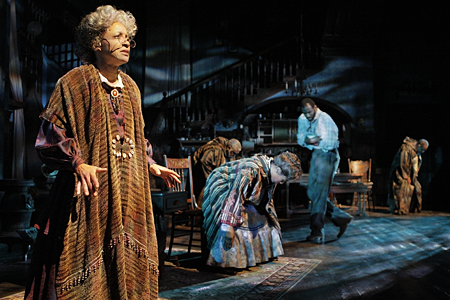 Toni Morrison's "Beloved" has been removed from the programme of an advanced English literature class, in a high school in Michigan. The reason is that two parents complained the book was 'simplistic pornography'. Now, I wonder why in this school they let parents who don't know anything about literature take decisions as important as what their children should and should not study. It took a committee to decide that "Beloved", the most important work of a Nobel Prize laureate, should remain in the programme!
Toni Morrison's "Beloved" has been removed from the programme of an advanced English literature class, in a high school in Michigan. The reason is that two parents complained the book was 'simplistic pornography'. Now, I wonder why in this school they let parents who don't know anything about literature take decisions as important as what their children should and should not study. It took a committee to decide that "Beloved", the most important work of a Nobel Prize laureate, should remain in the programme!
One of the parents claimed that "Beloved" contains 'gratuitious language, violence and sex acts that provide no historical context for the reader'. It is evident that Barb Dame, the mother in question, doesn't know the history of her country (or perhaps she is a rather insensitive person), because you clearly cannot say that the violence in the book (rape, whipping, murdering, the hanging of slaves etc) has nothing to do with the history of black people in the USA. The sex acts in the novel have a highly metaphorical meaning: they stand for the difficulties that black people in America experienced regarding normal, healthy love relationships. Starting a family in the wake of the horrors of slavery, when fathers and mothers were bought and sold and children were born only to live a life of suffering, is what lies behind some of the acts in the novel.
Another thing they complained about was the language in the book. Although the book is usually described as stylistically complex and poetical, Matt and Barb Dame complained that the lexical level of the book is only suitable for a fifth grader (10-11 years old), thus comparing the book to Roald Dhal's "James and the Giant Pea", a popular children's book.
Personally, I think this is racist and it makes me think of a similar piece of news. A couple of months ago a review of an anthology of twentieth-century American poetry written by Helen Vendler caused a stir and a fierce debate on the American canon. The anthology, according to Vendler, includes too many black poets (the editor is in fact Rita Dove, a distinguished African American and a poet). Skimming over her other controversial claims, Helen Vendler observes that the poems chosen by Rita Dove are often 'of rather restricted vocabulary'. As if complicated words made good poems and simple words could not. Now, that black American writers sometimes use a relatively simple vocabulary compared to that of their fellow white writers is a fact. They do this on purpose, of course. It is part of their political agenda. African American theorists like bell hooks and Alice Walker have pointed out that. That Rita Dove has chosen accessible poems (except when the choice was inevitable, as for T.S. Eliot's "The Waste Land") is simply the result of her taste. Every anthology is the result of one's sensibilities regarding literature.
 |
| Harold Bloom |
Nobody nowadays takes anthologies as the Gospel truth. The time when Harold Bloom could choose 26 authors - all male but for Austen, Dickinson, Eliot and Woolf - and decide they were the Western canon is gone, thank God. That time, nonetheless, is not that far away ("The Western Canon" came out in 1994). Personally, I think it is ridiculous to annihilate every form of canon, because without some shared authors, what would we talk about? It would be a discussion between deaf people. At the same time, I think one should be free to value some writers and dislike, or even discard, some others. A fine balance is hard to find, I agree, but nothing come easily in literature criticism.
Read the full review here and Rita Dove's answer here. Also have a look at this long but interesting article appeared on The Australian, where I got the reference to Harold Bloom and his canon, a topic that was buzzing in my mind for a while. I have many more things to say about Vendler's article (what about those infamous statements about Gwendolyn Brooks?), but I'll save that for another time.







